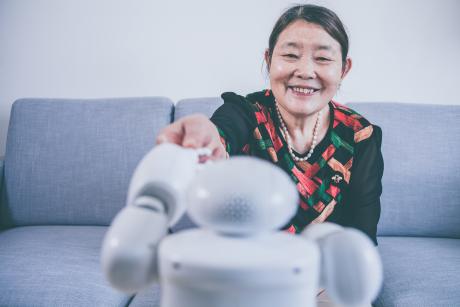Every day, those of us in the caregiving field see first-hand that hospitalized patients are better off when their caregivers are deliberately involved in the patient’s recovery process. Studies from groups like the Committee on the Learning Health Care System in America and the University of Pittsburg Medical Center paint a data-driven picture of what happens in hospital rooms and homes when caregivers are involved in patient treatment and care. University of Pittsburg Medical Center’s 2017 study found that integrating caregivers into discharge planning resulted in a 25 percent reduction in risk of the older adult patient being readmitted to the hospital within 90 days, and a 24 percent reduction in risk of being readmitted within 180 days.
Supporting caregivers improves patients’ experience of care and the economic outcomes of patients and healthcare institutions. Since 2010, the nonprofit Guiding Lights Caregiver Support Center, has been providing tailored support and referrals to caregivers in Wake County, NC, and seven surrounding counties. Although the team and board members at Guiding Lights knew anecdotally that these tailored referrals were making a real difference in the lives of patients and caregivers, the organization needed to quantify those benefits.
Tracking Outcomes Via Pilot Study
To that end, in 2018 Guiding Lights partnered with Alignment Healthcare (a mission-based Medicare Advantage plan that serves 7,300 members in Wake County) on a pilot study to examine the impact of caregiver interventions on patient health outcomes and healthcare savings when working with high risk Medicare recipients.
Working together, Guiding Lights provided free, individualized consultation on community resources and services to caregivers of Alignment members. Alignment then monitored changes in rates of professional claims, facility claims and rehospitalizations. Alignment selected study participants using chart review, annual wellness assessment, risk stratification or case management rounds.
The caregivers of these participating members were matched to Guiding Lights referral services, which involved a Guiding Lights referral specialist engaging in an in-depth phone consultation to understand the caregiver’s specific needs and situation, and then connecting the caregiver to free resources and support.
Stories like this illustrate member and caregiver situations encountered in the pilot:
The daughter of two Alignment members—a 78-year-old woman who has had several mini-strokes and related difficulties speaking, and her 89-year-old, wheelchair-bound husband living with lung cancer and rapidly deteriorating health—shared with our referral specialist that she was concerned that her sibling was mishandling her parents’ finances, possibly resulting in their home being foreclosed upon in the very need future. Also, she needed assistance with her father’s bathing, shaving and catheter care.
Our referral specialist matched the caregiver with Elder Matters, an organization that specializes in mediation; connected her with financial support through Veteran’s Administration Aid and Attendance; and connected her with a Guiding Lights nurse who provided guidance and tips on the caregiver’s role in catheter care. This caregiver says she feels more confident in dealing with the physical needs of her loved one and has since visited our center for training on how to provide additional physical care with her loved one with one of our nurses in our skills lab utilizing a nursing mannequin.
We know that such referral interventions can change the lives of caregivers and patients, but through the Alignment study we saw the economic and systems-level impact of the interventions. Of the 76 Alignment members who received referrals to Guiding Lights, 26 members were included in our study. These were members for whom Alignment Healthcare could access data on claims and hospital admissions for a period of six months prior to the referral intervention, and for a period of six months after the intervention, as well as members who did not have any high-cost claims.
When looking at trends in the healthcare field, we typically use the unit of “member months.” In the case of our study, the 26 members that were included added up to a total of 312 member months—156 member months before Guiding Lights referral services and 156 member months after the referral services.
Those who received referral interventions saw a 50 percent reduction in hospital admissions and readmissions.
In looking at trends in these member months, we saw that there was a nearly 20 percent, or $53,000, reduction in claims for those Alignment members who received Guiding Lights’ referral services. Guiding Lights made a nominal $6,000 investment (representing one month of one referral specialist’s salary and benefits, plus overhead for liability insurance, telecommunications and office space rental) to achieve this return of $53,000.
Reduction in claims is not the only measure of impact, however. We saw a significant reduction in hospital admissions and readmissions: those who received referral interventions experienced a 50 percent reduction in hospital admissions and readmissions, overall.
Calling All Health Systems to Consider Caregiver Support
The data from our pilot study is likely no surprise to those in the field who know that supporting caregivers makes a big difference for the patients we serve. However, the dollar figures and hospital readmission data help to make the economic argument for caregiver support.
It is Guiding Lights’ hope and the hope of study collaborators Senior Medical Officer at Alignment Healthcare Dr. Adam Wolk, and Guiding Lights Caregiver Support Center Board Member Cooper Linton, that healthcare systems will invest in caregiver support as part of their overall model for patient care.
“Caregiver support and training is an important and under-appreciated social determinant of illness,” said Wolk. “In my experience, even the most well-designed and -resourced hospital admission reduction program will fail if it doesn’t address (or at least account for) the well-being and competencies of the primary caretaker.”
Nicole M. Clagett, is executive director and co-founder of Guiding Lights Caregiver Support Center, in Raleigh, NC.





